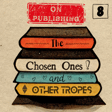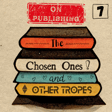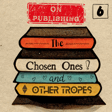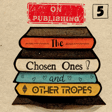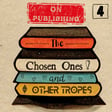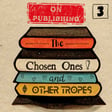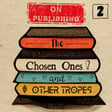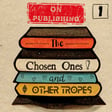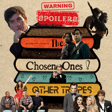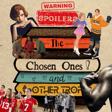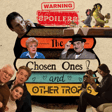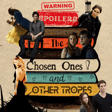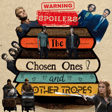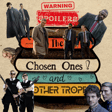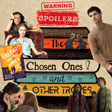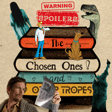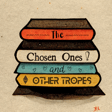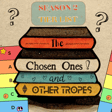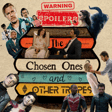Become a Creator today!Start creating today - Share your story with the world!
Start for free
00:00:00
00:00:01

S1.E1 - Unreliable Narrators
Is there such a thing as a reliable narrator? Tune in for our totally 100% reliable ramblings on the subject!
- Naomi Gibson, author of Every Line of You & Game Over Girl
- Melissa Welliver, author of The Undying Tower & My Love Life and the Apocalypse
- Jamie Greenwood, creator & host of the Write and Wrong Podcast
Transcript
Introduction to Podcast and Theme
00:00:00
Speaker
Welcome back to the chosen ones and other tropes where I ask two published authors about their favourite tropes and the ones that make them want to cry.
00:00:20
Speaker
Thanks for some people being. And it made you sad. And total often it made you sad. That is so bleak. I was reading it and I was like, damn, this girl should have done a hard life. You're going to make a lot of enemies on the internet talking into the night. That's the way everything that's stuck.
00:00:41
Speaker
And we're back with more storytelling chat and this episode is all about trust. And in the spirit of trust, I'm going to do a big heads up because we are about to talk about unreliable narrators and the spoilers are going to be out of control.
00:01:00
Speaker
So it's easy to reserve judgment on a character in a story. They have to prove themselves to you. But surely you can trust the narrator. They are after all the one telling you the story. They wouldn't lie to you. Yes, they would. And they do frequently.
Understanding Unreliable Narrators
00:01:18
Speaker
I mean, how much did Nick Carraway even know about Gatsby?
00:01:21
Speaker
And let me tell you this, you can never be sure, because even David Attenborough, he isn't narrating these documentaries live. Those camera shots aren't sequential. They're not taken all at once. It's cut, shifted, moved around to make you see and hear exactly what the narrator wants you to hear. I mean, the most recent one was about dinosaurs. And let me tell you, that didn't happen. It wasn't live. It's fake.
00:01:46
Speaker
You ruined that show for me too. I've ruined that for everyone. Now we're all confused about nature documentaries. Let's get into it. Who better to kick us off than Naomi Gibson, whose new book Game Over Girl is out right now?
00:02:02
Speaker
Yay, thanks so much. That was a great intro. Yeah, and reliable narrators are so exciting to write, personally, I think, and I had such a good time doing it, and for King, we were girls. And I think they are books that I naturally gravitate towards, and they lend as trope that lends itself so nicely to thrillers.
00:02:23
Speaker
and particularly psychological thrillers, which are obviously my favourite. But yeah, I was thinking about this when we said we were going to talk about unreliable narrators, and I was thinking like, there's this big question over like, who is actually reliable anyway, if you're reading something in first person, which I think may be relevant, you might talk more about that. But I was thinking like, there's not just like one type of unreliable narrator, there's, I've actually broken it down, are you ready?
Types of Unreliable Narrators
00:02:51
Speaker
Let's go. I reckon there's about four different types of collaborators. So you've got like the madman who's got this crazy ideal. Or woman, or mad woman. Yeah, or mad person, sorry. Or mad person, yep. And the examples of that I was thinking about were like, you know Humber Humber in Lonely Turn, that really famous book when this guy just wants to get off of this teen girl.
00:03:19
Speaker
And it's just like the most unreliable book ever because he's like trying to, he like basically kills her mother and takes her away and stuff like that and has his way with her. And he's like reasoning it with the reader, like totally trying to get them on board with it. And then another one is you, like Joe and you, he's pretty unreliable. He's quite crazy. And then I was thinking another category is the liar.
00:03:44
Speaker
And I thought, like, the liars can kind of, like, do, they lie to people in different ways. So, like, you've got the narrators who lie to themselves, either because they've had so much trauma in their past that they don't want to remember the truth. So they're telling you a version of events that may or may not be real a game over girl.
00:04:07
Speaker
And so, in so doing, they're lying to you, the reader, and you have to work out what really happened and follow them on their journey as they fall down that rabbit hole. Yeah, I guess that's like the usual suspects as well. Yeah.
Unreliable Narrators in YA Fiction
00:04:19
Speaker
Well, no, you see, I think he is just, he's the other kind of liar. He's just lying outright. He's lying to you deliberately. Oh, yeah. So, yeah, I've got him down as like a really good example of someone who's just outright lying. But the people who lie to themselves, I think are more interesting. Oh, I see. Okay.
00:04:36
Speaker
And in terms of story so like you know like girl the train for example she's got like a big blank in her memory cuz she drank so much that night she doesn't remember what happened and so she's trying to work out what happened as much as you are really and then fight club in that as well.
00:04:54
Speaker
Yeah, yeah, I think so, because he didn't realise either. Well, he knows, but he also doesn't let himself know, right? Yeah. And I think Sarah Pimra recently wrote Insomnia, which is about a woman who has insomnia. And slowly throughout the book, she becomes more and more unreliable because she just doesn't sleep. And it's like, how much can you trust someone who has insomnia in each other? Who's trying to tell you a story? It's interesting.
00:05:22
Speaker
And then my last type of unreliable narrator. Oh, no, wait, I've got two, sorry. Sorry. Is it two different types of liars, but it's one category? Yeah, two different types of liar, one category. And then my third one is the exaggerator, who I think you would maybe fix into this one. Name of the wind, looking your way. Yeah, yeah, yeah. So as soon as we announced this episode, I was like, name of the wind.
00:05:47
Speaker
Yeah. And you've also got the innocent narrator who kind of has a really skewed view of the world. Perhaps they're really young or perhaps they like flowers for Algernon is a really good one. He's kind of
00:06:04
Speaker
an adult, but he has the mental capacity of a really young child, so his view of everything is many different. They kind of do that in Forrest Gump as well, where Forrest innocently looks at things which are bad, that he doesn't understand. See, that's interesting you brought him up, because I think he's an exaggerator. You think so? Yeah, because his story is so ridiculous.
00:06:28
Speaker
Are you calling Forrest Gump a liar? That's the point, though. So he's sat on this bench, isn't he? And he's telling these people this story. And you don't realize his story is true until at the very end, when he's in a magazine, you see his picture in a magazine, and it's like, oh, right, shit, he is true. He is telling the truth. Like, OK, you take it out of face value because he's got so much detail in it. But he could just be sat there, like, exaggerating, like, oh, yeah, I won a ping pong championship. I went to the wall. Like, I met the president, you know.
00:06:56
Speaker
Like LeBron James, right? It's never heard someone like say Forrest Gump, the nicest man in fiction. So funny. So what were the categories again? So I've got the madman, or the mad person, and the liar, which is, you know, they can either lie to themselves or lie to you. And they've got the innocent narrator and the exaggerator.
00:07:23
Speaker
And they're all really, really good. And they all lend themselves, you know, in totally different ways to fiction. But my favorite person, they're the people who lie. Where would you put, I'm guessing it's in the lie category. If you did Cynthia Murphy's, Windu's Kill Die.
00:07:40
Speaker
Mm-hmm. Yeah. Probably in the live category, I guess. That'll definitely be in the live category, I think. Yeah, for sure. Yeah, because they brag about it as well. Do they brag about it? Yeah, in the beginning, they're like, that's killing someone. That's true, yeah, literally the opening. True, true, true. What about you, Melissa? You have also written YA in first person.
00:08:01
Speaker
Yeah, yeah, so this is the problem I had at you when I saw the name of the episode. So interestingly, I do not gravitate towards thrillers on the whole. I love Naomi's because they're sci-fi thrillers and I am quite specific and genre-y like that. So like I will read other stuff. I started a book club literally because I was becoming so genre specific and I was like, I need to read something outside of sci-fi or something to go and say.
00:08:23
Speaker
But I do like really Naomi's, especially because the sci-fi and also like horror, which is also why I've read, certainly is thrillers. On the whole, I don't massively go in for thrillers. So it's interesting Naomi was saying about like, oh, it lends itself quite well, psychological thrillers. I think it does. Because the very few I could come up with, like, I did also think of Gone Girl.
00:08:42
Speaker
Yeah, obviously. And like, that's kind of, again, spoilers. That's kind of like a big reveal partway through is like, guess what? Everything I've told you was actually a manipulation and then you're still not sure. Then from that point, you don't trust anything. And that's kind of like the whole point, right? And at the beginning, you do trust it. And then halfway through, you're like, oh no, my perceptions have been turned. You don't know what to trust.
00:09:02
Speaker
And I started reading Game Over Girl yesterday and I'm only halfway through. So no spoilers for that Naomi, people want to buy it. That's the one thing we're not going to spoil. And yeah, already I can see this is somebody that when the main character does things, again it's written in first person,
00:09:20
Speaker
It is sometimes you have to double take me like wait hang on did she just pick that up why does she pick that up and like when she's thinking about certain things and repeating certain phrases about Accidents have happened in the past you think did that happen did that really happen and you're not quite sure.
00:09:36
Speaker
And yeah, I think maybe I didn't think of it as necessarily unreliable narrator in YA, because a lot of YA's written in first person, and usually from a teenage girl, and usually in a very emotional heightened sense of the word, like they're in the middle of a revolution or in love with a vampire and a werewolf who would like to choose.
00:09:55
Speaker
And so, of course, really, technically speaking, I suppose we should be thinking a bit more, are they telling us a full story or is it the story as they see it? And the story as they see it, I get great voice, right? So it's like what makes a fun voice is that somebody's only telling you from their perspective. So you're kind of on their side, even if you peel it apart, you think, actually, I shouldn't be on their side for whatever reason.
00:10:14
Speaker
So yeah, I found it, it was a really interesting one for me, because when I actually tried to think about it, I didn't think I'd read many, but then I did notice all the ones I had read were thriller. So obviously it does come into all this stuff, like you're talking about Name the Wind, and obviously that's fantasy, question mark. Yes. Fancy, yes. Read it.
00:10:32
Speaker
I'm so bad with fancy as well, as they say. Like, oh my gosh, honestly, I'm the worst person in the world. I used to be so much more eclectic, but now I'm just not. But I think, yeah, loads of YA could fall into unreliable narrator. Yeah. Name of the wind we should talk about as its own thing later, because it once again, like, it leans so heavily into the trope, it kind of goes beyond the trope. Yeah. Okay. The YA, yeah, it's so interesting seeing how much YA is written in first person. Yeah. So then my question is,
00:11:01
Speaker
And Melissa, you know, the Undying Tower is first person YA. Yeah. Do you think it's reliable?
00:11:08
Speaker
Yeah, see, um, actually possibly not purely because it also plays with, so a lot of these unreliable things play with memory. So game over girl massively is playing with memory. We're in the present with the main character Lola, but we're not sure if what she's remembering and telling us is correct or whether it actually matters, whether it's correct. And they literally test that because I'm sure I can say that it's on the blurb. They test that through a virtual reality game.
00:11:33
Speaker
where the only rule is you're not allowed to make anything that's from reality and even Lola is confused by the instructions and it's obviously because she's not quite sure what's reality and what's not and you know that from page one whereas Sadie in the Undying Tower like there's a load of um
00:11:50
Speaker
What's the word for it? Flashbacks. I originally wrote those as the first 10,000 words of the book and then had to cut them until I get to the interesting bit quicker. I put them back in as flashbacks. They weren't originally flashbacks. They were happening as she's speaking and therefore reliable, quote unquote, I guess. But now I think of them as flashbacks. She's also coming at them from the point of view of privilege and she's changing how she thinks whilst looking back at these memories.
00:12:15
Speaker
So they probably are less reliable, she's not in the liar category, but I think she might have been in the lying to herself category. Yeah. Yeah, because she's having to rethink something that happened, and it did happen that way, but maybe not for the reason she thought, if that makes sense, because it's all about revolution and being oppressed. She's singing it through a certain lens, isn't she, at that point? Exactly. And then she re-examines what she understands about the world she lives in, yeah.
00:12:41
Speaker
Yeah, so I think it definitely does. Yeah, I think YA especially and because YA is all coming of age and it's all about what do you think about things and what are your opinions? Are you teacher's opinions? Are you parent's opinions? What is your opinion on this thing that you have seen?
00:12:56
Speaker
I think it definitely does lend itself really well to YA, even if it's not necessarily obvious it's a reliable narrator. Do you know what I was thinking just as you were talking? Sorry, I was listening. Just like you were talking about.
00:13:12
Speaker
as you're talking about, like YA as a category generally. I would say that most people who write YA are probably adults, like you get the occasional young adult teen, adult writer, but most of them are probably adults. So it's like, does that make them unreliable anyway?
00:13:28
Speaker
Yeah. Because they're being written by someone for some time. With hindsight. Masquerading is like 70. Yeah, with hindsight of, yeah. Exactly. So, yeah. They're all YA books. Yes. All YA Unreliable is everything. It's life Unreliable. Yeah, I think that's the problem. I think it was just, the only ones, it's funny, like you type in, so like, because we knew the Unreliable narrator, I typed into Google.
00:13:52
Speaker
Like top 10 unreliable narrator, you know, just to see down like good reads and stuff. What list do people put together with their favorite ones? And then you think to yourself, I've read, you know, I have read that and that is unreliable narrator. It's obviously like a particular trope that means, especially in something where you're trying to work out.
00:14:10
Speaker
something else so obviously like psychological thriller where you like don't know who the murderer is or you don't know who the bad guy is or you don't know who the sniper is then of course it's really helpful to use unreliable narrator because you're trying to confuse the reader at the same time as your characters so it totally works and makes sense yeah yeah I guess in that's in terms of the trope whereas also it could be applied to anything that is first person and anyone that has a flaw
00:14:36
Speaker
Because obviously your characters, a good character has a flaw at the beginning that they don't see, right? So then if they're trying to become a better person by overcoming that flaw, then they have to become more reliable in the second half of the book, but maybe the first half of the book, they're always unreliable.
00:14:51
Speaker
Yeah, so it's the want the need thing, right? And the idea is the character doesn't really know what they need. They only see the want. So if you're writing in first person where the character is the narrator. Yeah. So do we think there is no reliable first person narrator doesn't exist?
Debating Reliability of First-Person Narrators
00:15:10
Speaker
I did a history degree and I remember just thinking the same thing. Yeah. And I remember they would always say like, oh, well, this is true. Why is it true? Well, there's a photograph of it happening because that doesn't mean it's true. And then of course you get to conspiracy theories, don't you? Like, did someone shoot JFK? Who knows? It doesn't matter. There's a video of it. And you can play, you can start obviously driving yourself insane by playing that game all day.
00:15:33
Speaker
So obviously when people are writing it of course they see the narrator as reliable probably especially outside of say psychological thriller I didn't like necessarily on purpose right Sadie to be unreliable when she's looking back on the instances especially because they were originally part of just like a chronological order text but I can accept in hindsight again the hindsight thing.
00:15:56
Speaker
that it could be unreliable but i think most characters you have to believe they're reliable because it's obviously the author trying to describe to you what's happening most of the time and if it's not a thriller or there's no element necessarily of mystery to it then you kind of have to trust the writer a little bit.
00:16:16
Speaker
It's degrees of reliability right it's the lens do you experience the story through yeah because if we're if if one of the categories of being an unreliable narrator is naivety or just not knowing something so. The sixth sense so in theory like his bruce will assist character.
00:16:36
Speaker
thinks he's not hiding the knowledge for himself. He doesn't have the knowledge that he's, spoiler, dead. So he's unreliable because he lacks the knowledge, which helps you go through the journey with him. And I think it's kind of the same thing with the great Gatsby, which for me is one of the obvious unreliable narrator things. The whole point is that
00:16:59
Speaker
Nick Carraway, who kind of tells the whole story, he's the character you follow. He meets Gatsby as you meet Gatsby, and he learns everything about Gatsby and all the stuff that's going on at the same time you do. So like, the tale that he's telling is true to what he has observed and what he sees and what he believes. Right, exactly. But it's still unreliable because he doesn't know. He's just a guy.
00:17:26
Speaker
He's also from, is he not from a different social background as well? So his view... Which one? Gatsby or Caraway? Caraway. Yeah. Well, Gatsby is like a social outcast, kind of. Yeah, but like he's obviously like really wealthy and Caraway isn't. And I think that, does that not colour a lot of what he says? Like, because that gives him like opinions.
00:17:48
Speaker
I mean I think Carraway is part of that class he's not in the same he's not as rich as Gatsby but isn't that the Gatsby is shunned by everyone it's a whole but yeah no I think you're right but the overall thing is that you view your viewing it as another character is learning it so yeah.
00:18:06
Speaker
It's like, it's interesting to have an unreliable narrator because they serve that kind of Watson role where it's like, they need to ask questions for you as the reader, also asking those questions. Yeah, exactly. Which is why it lends itself to that mystery element massively. And that is why it's a trope that's used so often with mystery elements, because it's a really nice way for the author to bury clues.
Role of Unreliable Narrators in Mystery Genre
00:18:33
Speaker
I was watching this morning a TikTok from a mystery author and she was saying exactly that like you've got to put your clues but you've got to bury them in the sand until only a tiny bit sticking out that you're just about seeing. A really nice way to do that is with an unreliable narrator because you're not sure what's a clue and what's a red herring.
00:18:51
Speaker
Yeah, that's true. How often do you guys, it doesn't need to be a twist, but I think so much of the time, unreliable narrators, especially the ones that fall into some sort of mental illness category do end up to some degree coming out as a twist. So I'm thinking of like Shutter Island, Fight Club, American Psycho. Yeah.
00:19:18
Speaker
And all three of those, well, American Psycho's less, it's more just ambiguity. It's like, did he or didn't he? Yeah. But the other two, like Shutter Island is, you know, you're given a narrator which is posed as being a sane person. You then find out that the whole thing is sort of a delusion.
00:19:35
Speaker
Yeah, it's interesting as we sort of learn more about mental health, those sorts of stories. I'm trying to think of a more recent of those sorts of stories because I think as we get more into understanding mental health better and how those people put things together, does it necessarily mean that anybody that has a mental illness is unreliable when they're telling you something? And that's quite a common trope as well.
00:19:58
Speaker
Oh, what was it called? Oh gosh, I want to say canine, but that isn't what it was called, was it? Canine. Doctor Who's Dogs. It was, oh my gosh, I'll find it, but it was an alien movie about a guy who thinks that aliens have invaded and you find out at the end that aliens have invaded and he was totally right. But throughout the movie, you definitely lean towards he's wrong because he's in a mental hospital.
00:20:29
Speaker
And obviously, yes, it's a Kevin Spacey film and obviously nowadays would not necessarily be on a Kevin Spacey film. However, it was an interesting concept in terms of talking about mental illness.
00:20:43
Speaker
Yeah. Again, but again, that one, that one I think is ambiguous. I wouldn't say it kind of confirms. No, it is. Yeah, you can argue with people about what the ending is, right? Yeah. So I guess that's actually in the same line as American Psycho. Yeah. Where it's, yeah, the thing is left up to debate. It's like, was it all a cover up or did he just not do it? Yeah, exactly.
00:21:05
Speaker
Yeah. I mean, it's, it's so interesting. Here's one that I had, which I thought was interesting because, uh, and, and I'm, it's going to sound like I'm criticizing this as if I didn't enjoy it, but I loved this trilogy.
Criticism of Manipulative Narrative Techniques
00:21:16
Speaker
Um, and that's the red rising trilogy. And it's, um, it's, it's pretty steady sort of YA, um, narrated throughout. I do remember that being one part where I felt like they, he uses the,
00:21:35
Speaker
The sort of he's kind of manipulates the point of view with the narration. Which I felt a little cheated by I mean I enjoyed it I absolutely love the whole the host the whole trilogy original trilogy I haven't read the new ones. But there's a part where he essentially does a sort of time skip and you as the reader are just sort of so like a time skip has happened.
00:22:01
Speaker
You get to this point and then it's revealed that one of the characters has been secretly in training with like one of the greatest fighters of all time. And now he's like an incredible expert swordsman or whatever. And it was all done as like, oh, it kind of retroactively goes, yeah, because I was doing this in the time skip when this thing was happening. And I was like,
00:22:29
Speaker
That's cheating, isn't it? There's no clues. There's nothing there. That's like fully unreliable, because now you are actively concealing from the audience. Twilight Five, Carlisle dies, everyone dies. Oh wait, it was in Alice's mind. Yeah, the movie.
00:22:49
Speaker
I would stand there watching that and Ollie was going, no way. And I was like, what is happening? I know, they just changed everything and then boom. I'm an unreliable narrator, said the director. I was like, oh, OK. Yeah. Thanks. Right. Yeah. I know what you mean. It can sometimes feel like a cheat. This is what I was talking about, maybe with the red herrings versus clues as well. I think it's fine as long as you if you can go back and find that clue, then it's OK. If you miss the clue, that's, you know, that's on you. That's your problem.
00:23:17
Speaker
But as long as it's signposted in some way, like you could have worked it out, I think it's fine. So like in Gone Girl, and obviously the reveal is kind of midway through, but she's still alive and that it's not true. But there are the clues because she goes back and shows you them, especially in the movie. I read the book as well. I read on holiday like really quickly. I've seen a movie a couple of times. And yeah, she does go back and show you where the clues you missed.
00:23:41
Speaker
But they're like, oh God, I'm so angry. You know, yeah, that you're right. I totally should have seen that. So I think that's, that's fine. Even using an unreliable narrator, but yeah, I think it is a bit cheeky if they don't signpost it and go, surprise. I just lied. Yeah, surprise. Yeah. A thing happened when you weren't watching.
00:23:58
Speaker
People just don't become unreliable. Like, you would probably do something throughout the book that demonstrates that you're unreliable in other ways. Like, you could be morally ambiguous in other ways. Like, so, sorry to refer back to my own work, but I gave him a girl like my main character. She steals things, you know. She's doing things already that I kind of, like,
00:24:22
Speaker
Should you be doing that? And it just makes you doubt the character. They don't just suddenly do something that makes no sense. You have to build it in. And when you pull that rug from under the reader, like we're just saying with Gone Girl, you have to be able to go back and be like, oh, that's why you did that. And that's what this was about. It has to be substantiated, I think.
00:24:43
Speaker
I mean, the extreme example of that is you, where he's obviously, Joe is obviously a terrible, terrible person, but because you're locked into his point of view, there's a part of you that sort of is really trying, and I think it's such a human thing, because you're reading from a person's point of view with their thoughts, and there's a part of you really trying to sympathize.
Sympathizing with Morally Ambiguous Characters
00:25:04
Speaker
Yeah.
00:25:05
Speaker
which is really messy. Yeah, absolutely. Another one that I had was Agatha Christie style. This kind of ties into the whole cheating thing because I've watched a lot of the old Poirot and Miss Marple
00:25:24
Speaker
And they do the thing where the detective, they show you lots of the evidence, but they never show you all of it. And they do the thing where the detective like runs through why this piece of evidence implicates that person. They implicate every single person who apparently lives in wherever there it is.
00:25:42
Speaker
Um, but they'll never give you the final piece of the puzzle. And like, once you've watched enough of them, you're like, okay, so I understand how this works and it's impossible for me as the reader slash viewer to, to guess who the, who the, well, to, to actually know who the, who the murderer is because you always hold her back from me because it is inherently unreliable.
00:26:09
Speaker
Yeah, that's so true. But I mean, that's so ingrained in the genre. In the genre. So that's like the trope really, really like grasping onto its own thing, right? Like that is a trope used to the extreme. It's going to be the same formula every time, which is why it does so well. It's like romance does well because it always has the AGA, the happily ever after, so you know what to expect when reading it. And crime is exactly the same. Like you know what to expect when reading it, you know what to look for, you know you won't be given the final clue.
00:26:36
Speaker
That's okay if you're going with those expectations that's well that's what's clever about say gone girl is that it takes the trope and kind of runs a little bit with it because obviously you're being told well actually all the clues you might have been given might have been wrong and actually this and you know so you can't trust what you've already read but maybe you can because I've just told you everything and I think that's why that one twist it the other way around whereas those classics.
00:26:58
Speaker
they're using that trope to its furthest extreme, right? Because you can definitely, the person you never trust weirdly is, I find anyway when I watch those, is the investigator, because they are always hiding something from you. Like, they're so famously in Sherlock Holmes, he's always saying something and he's like, elementary my dear Watson, and Watson is us going, what? What is it? You've not told us. It's like, that's me, you know? Like, what is it? I will tell you at the next scene. I will wait till I collect all of the suspects and then I will reveal. It's like, oh, okay, I can't trust you then, cool.
00:27:29
Speaker
But it's funny, I mean, talking about going to the extreme of unreliable narrators is, I'll bring it back to the name of the window. You're going to be so interested by this when you finally get around to reading it Melissa, because we talk about it all the time. Yeah, persuade me, let's go. I can't wait.
00:27:44
Speaker
But this isn't the spoiler, it's like the way that the story is set up is that it starts in quotes present and the main character is in a tavern and he basically gets convinced to like tell his story. So the whole thing is posed as he is retelling his story to you. And he doesn't, he almost, he tells you the lies that he told when he was younger.
00:28:12
Speaker
to basically he basically used to sort of something would happen and he would embellish it, but he as he's relaying the story he tells you that he embellished this so that he would gain a sort of greater reputation throughout that kind of area and you kind of accept that and then I think.
00:28:29
Speaker
As I was reading it a part of me was like okay so he's trustworthy because he's telling me where he's embellishing it but then after I'd sort of finished and was thinking back to I was like well surely then he's just embellishing everything.
00:28:44
Speaker
Cause you're hearing him telling you the story of when he was younger and he was like, Oh, and this is the thing that I exaggerated. And then you're like, Oh, hold on a second. Yeah. And you know, the audience, whereas obviously usually in a book, the audience is that fourth wall, right? Whereas if he's telling the story to somebody in a pub, he's going to obviously.
00:29:01
Speaker
big up his part in. Well this is it, yeah. This is what I was thinking about particularly with the name of the wind is the fact that he is the hero of his own story and he makes you know it like every step of the way. And it's like I suppose if you are telling someone your story when you were in your prime and doing great things you probably would big it up a little bit and
00:29:22
Speaker
I don't know. Is it just normal? Is it just the way that you would tell a story to somebody? But on the other hand, though, someone in his pub does recognise him and like, I thought it was you, but I wasn't quite sure. Then he started singing this song and you knew all the verses and I know it's you now. And then suddenly he goes away and he's like, oh, well, yeah, maybe. And he plays it down and sort of pretends to be this old man again.
00:29:46
Speaker
It's like, you know, you just kind of flip-flopping between, well, was he actually that great? Or was it just a fact that he's obsessed with himself? And it's so interesting as well, because if the third book ever does come out, there's a part of me that's wondering, it's like, what if this, what if it was all a lie? You know, what if, what if he did?
00:30:04
Speaker
the story that he told is such an embellished version of what actually happened. Like he's famed for some very specific feats. The beginning of the book, he literally, like it's laid out that here's a list of the like things that he's famous for had having done.
00:30:19
Speaker
But those are essentially just check marks everything else is embellishment that he could be like expanding as much as he wants and there's a part of me that thinks it would be an amazing way to finish the trilogy. Would be for you to find out that he kind of did those things and like they were partially by accident like maybe he just got like credited for them and he never did them and stuff that would be so cool.
Acceptability of Embellishments in Storytelling
00:30:40
Speaker
But then on the other hand though, he's got that Basque guy demon running around him who thinks he's great. And it's like, well, someone else is obviously convinced he's great. So, yeah. I think the fact that we can have this much discourse about it.
00:30:58
Speaker
says that he's doing the trope well. It's interesting, yeah. It's like, we don't know what to believe, but it's kind of exciting in a way. It's a really good example of doing it, but he also, you know, he's going, he's leading so hard into, he's basically saying, I am unreliable. And then the narrator is saying, this is where I lied.
00:31:19
Speaker
how much am I lying now? It's a whole circle. So maybe sometimes it's better in the fun and game section of any series or book where you're in the middling, you actually don't know. I think sometimes you can be a bit disappointed if you find out at the end one way or the other, and it's almost more fun to
00:31:37
Speaker
debating. So I was thinking when you were telling me about it, it kind of reminds me of like, he's his own bard. Like it made me think of Dandelion with Geralt and how he makes all these songs. And of course, he's like, well, this didn't happen. That's not how it happened. And he's like, yeah, but it's like, it's a song, isn't it? So I'm going to make it like really fun and interesting and exciting. And is there a part of those, especially as authors and obviously in like, Day with the Wind, like he's basically authoring his own story, but obviously he's written by an author.
00:32:02
Speaker
Is it that when you're writing a story, it's okay to embellish it if it has a point? Because obviously we write in fiction, didn't actually happen, but obviously quite often we're like, oh yeah, you know, what do you want readers to take away from the story? Oh, let's take away this. So is it okay? And does that make you unreliable just because you are highlighting something?
00:32:21
Speaker
Yeah. Yeah. I guess you're just trying to get a response, like an emotional response. Yeah, that's it. Yeah. And we're just all secretly like massive fans of drama as a species. I love drums. Of course we are. Here's an interesting one. We've talked a lot about first-person duration, which we have, I think, concluded is inherently unreliable, no matter
00:32:44
Speaker
kind of what range you look at it.
Unreliability in Omniscient Narrators
00:32:46
Speaker
And then there's also the sort of, we've talked about the different categories and things like, do you guys think that a book written with an omnipotent narrator can be unreliable? No.
00:33:02
Speaker
Sorry, that was very immediate. No, I don't think so. Because... It would be cheating, right? Yeah, it would be like... If they're omnipotent, okay, so fine, they know everything. But like, usually it's presented through
00:33:21
Speaker
and the thoughts of someone else and they're describing what that person, how that person reacts and things like that to events throughout the book. The fact that they would lead you so far through the book describing how that one character behaves and then suddenly
00:33:41
Speaker
I don't think it would work, narratively. Is there an example of it? I'm just thinking that, because obviously omnipotence would be that they have all the power, whereas omniscience is that they know everything. So they're all like, did you mean... I meant omniscience, omniscience. Which is like a similar... No, no, omniscience is what you were talking about. I said the same word, I knew what you were going to say. Omniscience didn't make sense.
00:34:04
Speaker
Surely all authors are omnipotent, isn't that the whole thing? Yeah, that's true. Especially if you plot and don't let your characters lead you down a path, but that's a different podcast. Yeah, exactly. So I don't know. Yeah. I can't think of one where it's, I mean, obviously middle grade used to, especially when we were younger, like lean into the omniscient narrator where they're like, how, you know, like, there are some real doll stories and stuff where it's like, oh, let me tell you about this like story that happened.
00:34:32
Speaker
I'm even thinking the beginning of flipping, um, what's it called? Hunchback of Notre Dame or Aladdin, where it's like a guy saying, I can tell you the story of this whole thing that happened. And then it goes into the story. You almost forget that it's like being narrated by somebody. So I guess they're technically omniscient. And then of course in Aladdin, it's actually the genie. So he is also omnipotent. So there is a double example, but yeah, I don't know. I don't know if it would make a good story, especially in modern day, like how we tell stories contemporary times.
00:35:02
Speaker
Yeah, the whole point of an unreliable narrator though is there's this reveal when they themselves either suddenly realise they're unreliable or they reveal to you that they're unreliable.
Manipulation of Timelines in Narratives
00:35:15
Speaker
And I don't think that would work in third person because there's like that barrier
00:35:21
Speaker
You don't get that immediacy that you would with I and me. It becomes like she and her or whatever. And I think that would be too much of a barrier and the twist wouldn't work as well. Because if you're I and me or in their head, you're doing it, they're describing things as they're doing it and you're doing it with them. If it's she and her, you're watching. And I think it just loses that immediacy.
00:35:47
Speaker
What about timeline manipulation? Oh, that was really clever in The Witcher.
00:35:58
Speaker
Oh yes, it is very clever in the picture. Yes, the way that they do it in the movie, the TV series specifically. Yeah, I know what you mean. Yeah, no, it is really clever that you don't realise things aren't all happening at the same time. Yeah, that was really clever. And some things are taking longer than other things. Yeah, definitely. Yeah, I enjoyed that a lot. I think that works. And that was a bit unreliable narrator and it was a good reveal, but in a way that the narrator was like sort of a bit wink-wink unreliable, like they weren't telling me lies. Yeah.
00:36:25
Speaker
But they were like, ho, ho, ho, bet you didn't think this. And I was kind of in on the joke. You know, I was like, you got me. Yeah, it's okay. Yeah, I like that.
00:36:34
Speaker
I mean, I think the best example of that, that I could think of was Westworld season one. Yeah. Yes. It does a really similar thing. Yeah. But that one does it as it's, it's, it's like not really a twist within the, when the Witcher does it, it's just like, and now they all come together. Kind of. But it's so satisfying.
00:36:55
Speaker
But in Westworld, it's a huge reveal. I remember when the reveal happens that it's like there's like three separate timelines going on. And you've been watching this the whole time, assuming it was all happening concurrently. And that reveal just is so perfectly done.
00:37:12
Speaker
Yeah. It is not a wink, wink, you're in on the joke now reveal. It is a, oh my God, I thought these were three different people and they're not revealed.
Frustration with 'It Was All a Dream' Trope
00:37:19
Speaker
But it's a good reveal. But like that is, I mean, I guess there's not strictly a narrator. The narrator is whoever's, you know, the director, basically. But yeah, I guess in terms of an omniscient narrator, you can't really
00:37:39
Speaker
It'd be too difficult, I think. Yeah, I think so. It breaks so many storytelling rules that I think you would struggle to keep all people to thread together. Well, I would. I'm obviously too thick to do that because I can't even imagine like how difficult that would be to keep everything going and not piss off the reader to be honest. I feel like it would piss people off. Because I've just realised what it is. I've just realised what the omniscient, unreliable narrator is. It's a final page turnover and it was all a dream.
00:38:09
Speaker
Yeah, that's so true. That is so true. And then we woke up. And that does annoy people. Yeah, because it's very annoying. Yeah, it is annoying. Why did I sit through that then? Come on. I was invested. It was nothing. Yeah. So in conclusion, what do we think? We obviously know I'm a huge fan.
00:38:35
Speaker
Oh yeah, amazing. Actually, having written Game of a Girl where you've fully embraced unreliable narrator and it's very much a kind of core part of the book, did you feel, I mean, did you feel that every line of you, she's more, it's like she's unreliable? I mean, she is unreliable, as we've discussed, all first-person narration is unreliable, but she's not like, when I was reading that, I never considered her unreliable beyond just being first-person.
00:39:05
Speaker
No, I think she's, every nine of you I think is a different type of unreliable narrator in the sense that she is justifying her actions. Lying to herself. Yeah, so she's not necessarily out by lying, there's no memory issue there, but she's definitely making interesting choices.
00:39:28
Speaker
she's doing mental acrobatics to just actions exactly where is game over girl she tells you on page one that she hallucinates yes it is very early on lost grip on reality whereas i would argue that lydia loses grip on reality yes like i'm thinking about when she is a huge but when she locks a mom in the car
00:39:49
Speaker
It's like, okay, she's had, she's gone. Okay, cool. That's fine. Like, I'll carry on. Like, go for till now, I could defend, but yeah, this is bad. Okay. She might never be found. That's fine. That's just made me think of another example, which is, um, a monster calls, which I think falls into the category of lying to themselves because throughout the whole thing, he is trying to.
00:40:17
Speaker
He's not like I think he knows the whole time and the whole time he is trying to sort of repress the truth of how he feels about his mother's impending death.
00:40:28
Speaker
Yeah. But you get given enough clues in that, I think as well. So like, as you start to realise what's going on, it's sort of, it's more of a slow realisation as opposed to a jaha, jakuz, I know what's happening. It's a lot more like you start to realise, oh my gosh, that's what's happening. And it's almost like you're being prepared for that death as well, isn't it? Because it's a very slow opening. So I think that's done quite nicely and there's a slight twist on the trope because there isn't a sudden reveal. No, not really.
00:40:56
Speaker
No, that's true. You are led down the path, you know, you kind of work it out slowly, but don't want to believe it just like him. Yeah, when it's like, and when it finally is written in front of you. Yeah. And you're like, yeah, of course. Yeah, exactly. Yeah, yeah. It's very sad, but it was, you know, that's obviously how it was.
00:41:14
Speaker
perfection. I love that book. Yeah, it's really good. Very good. Awesome. So, in conclusion, no narrators are reliable.
Conclusions on Narrator Reliability
00:41:23
Speaker
We can't trust anyone. Trust no one. You can't even trust David Attenborough.
00:41:30
Speaker
I think it's degrees, right? It's degrees of reliability. Like any piece of media that you consume, whether it's a book, whether it's something on television, there is always some level of propaganda in it.
00:41:45
Speaker
because you are watching it written by a person who is writing another person. So, you know, just by the nature of reading a book and kind of gaining empathy for the character, you are viewing the world through their lens to some degree and then also the author's lens to some degree.
00:42:04
Speaker
unless they're omniscient, they cannot be relied upon. Like the genie in a ladder. Well, exactly. But then the person that wrote the genie was, I don't know.
00:42:19
Speaker
Yeah, also, also omnipienum and omnipotent because he plotted it with an inch of its life and knew where it was going and his characters never wavered. Of course, because that's how it works. Let's wrap it up here and for everyone listening, go and buy Naomi's book, Game Over Girl, it's out now. Yay!
00:42:43
Speaker
Thanks for putting up with our nonsense for another episode. To stay tuned to everything we're up to, you can follow the podcast on all socials at The Chosen Tropes. Follow Melissa at Melova, Naomi at Naomi G. Wright, and Jamie at Jamie X. Greenwood. Don't forget to check out Naomi and Melissa's books as well as the Right and Wrong podcast. Thanks again, and we'll see you on the next trope.
